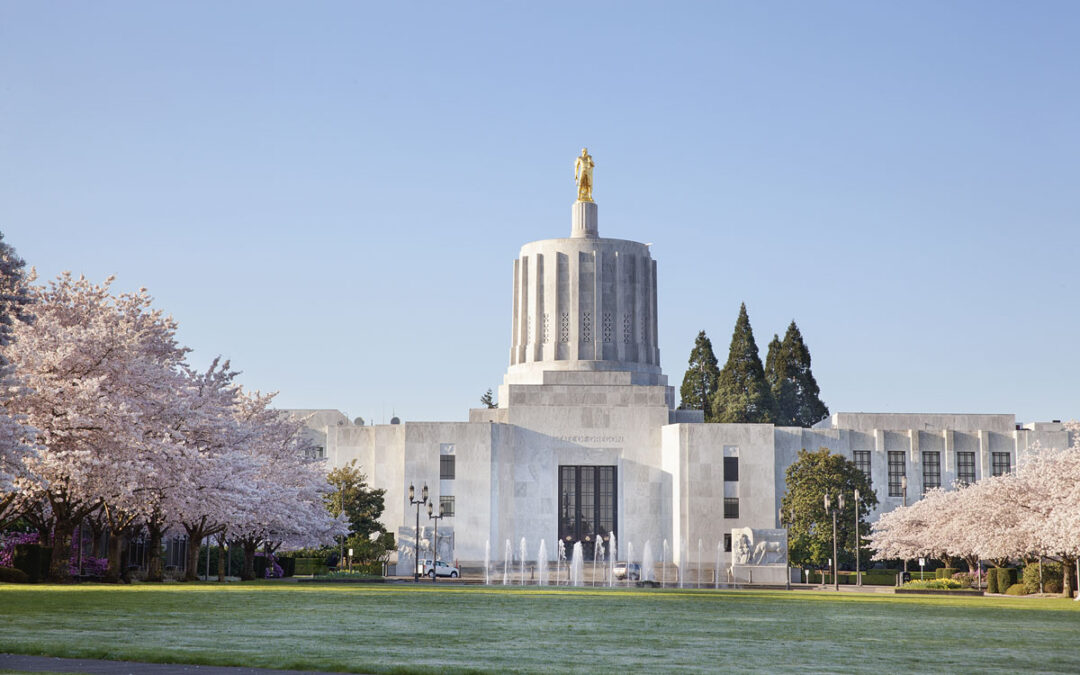
Dec 17, 2024 | AOC Advocacy
The 82nd Oregon Legislative Assembly met Dec. 10-12, in Salem, for its final interim Legislative Days committee hearings as well as a special session, called by Governor Kotek to appropriate funds to the Oregon Department of Forestry and the Oregon State Fire Marshal to cover costs related to the 1.9 million acres burned by wildfires across the state this year.
The 83rd Oregon Legislative Assembly will convene for a 160-day session on Tuesday, Jan. 21. View the 2025 Legislative Assembly Calendar here.
The Association of Oregon Counties (AOC) Legislative Affairs department actively participated in and monitored hearings, and used the opportunity to connect with legislators while they were in Salem, particularly around AOC’s 2025 Session Priorities. Below are links and highlights from the hearings with relevance to county governance, services, and budgets.
Joint Committee on Transportation
The Joint Committee on Transportation’s informational meeting included a Highway Cost Allocation Study (HCAS) three-biennia look-back and progress report from the State Economist, the Legislative Revenue Office (LRO), and Oregon State University. A new HCAS is due to the legislature in January and will inform 2025 transportation package development. Among introduced committee bill drafts, which are mostly placeholders, is LC 735, requested by AOC and the Oregon Association of County Engineers and Surveyors (OACES). Created as a pilot program by the legislature in 2019, LC 735 makes permanent the County Safety Corridor Program.
House Committee on Climate, Energy, and Environment
The committee under the new leadership of Representative Lively (D-Springfield) met for a series of informational hearings on Dec. 11. The committee heard a presentation from the Department of Energy and participants of the Community Resiliency Program. The committee then turned to an update from the Department of Land Conservation and Development (DLCD) and the City of Salem on the Climate-Friendly and Equitable Communities program. Finally, the committee heard two presentations on Small Modular Nuclear Reactors and a progress report on the Wildfire Funding Workgroup being run by the Oregon Department of Forestry and the Oregon State Fire Marshal.
Senate Committee on Natural Resources and Wildfire
The committee heard a presentation by House Agriculture Committee Co-Chairs Representative Helm (D-Beaverton) and Representative Owens (R-Crane) on their 2025 Water Policy and Investment Legislation package.
Senate Committee on Energy and Environment
The committee received an update from Representative Gamba (D-Milwaukie) on his Transmission Work Group, as well as presentations on Clean Energy, Regional Power Planning, and the Climate Protection Program (CPP) at the Oregon Department of Environmental Quality (DEQ).
House Committee on Agriculture, Land Use, Natural Resources, and Water
The committee heard a presentation on both the location and impacts Quagga Mussels and Emerald Ash Borer are having in the environment. If you are aware of these invasive species in your counties, Oregon’s Invasive Species Council maintains a reporting hotline. The committee also heard from state agencies and the Oregon Association of Clean Water Agencies on Water Reuse, and an update on the investments the legislature has been making in water since 2021.
Senate Committee on Veterans, Emergency Management, and Federal and World Affairs
The committee heard an informational presentation from the Oregon Department of Veterans Affairs, which highlighted how investments in county Veteran Service Organizations (VSOs) and veteran outreach have resulted in a doubling of federal VA benefit dollars coming into Oregon to nearly $4 billion annually. The Department of Emergency Management also presented a year in review, and emphasized their “Be 2 Weeks Ready” plan for individuals to prepare for disasters.
House Committee on Emergency Management, General Government, and Veterans
The Oregon Department of Forestry and the State Fire Marshal presented an overview of the 2024 fire season and emphasized the importance of their preparedness initiatives to pre-position equipment and reduce the likelihood of fires turning into conflagrations. The committee also heard testimony from Rangeland Fire Protection Associations about their role in responding to fires and how much they are able to do with very little financial support
House Interim Committee on Behavioral Health and Health Care
The committee heard a number of task force updates including behavioral health worker safety, alcohol pricing and addiction services, and the behavioral health workforce study (recommendations forthcoming). The committee also adopted 24 committee measures, including LC 2736 which would require Coordinated Care Organizations (CCOs) to include, when possible, a county commissioner and a local public health official on their governing boards.
Senate and House Interim Committees on Housing and Development
The committees adopted placeholder committee measures and received an update from the Representative Marsh/Governor’s Sustainable Shelter Work Group.
House Interim Committee on Revenue
The committee began with the introduction of 28 committee bills including one to address AOC’s legislative priority related to assessment and taxation funding, giving the policy a guaranteed legislative vehicle for staff to work at the start of the 2025 legislative session. Other bill requests of note were three legislative concepts addressing AOC’s 2024 priority around foreclosure sale surpluses, concepts relating to income and property taxes, and other maintenance or placeholder bills. Committee members also heard from the LRO who presented informational meetings on the income tax credit report, property tax exemption report, Oregon pass-through entity tax rates, and a timber tax review.
Joint Interim Committee on Judiciary
The joint committees for the House and Senate heard several informational presentations, including from the Specialty Court Task Force who presented the results of their findings, and found that those who participated in treatment courts were substantially less likely to recidivate compared to those who went through a traditional court system. There was discussion for multi-circuit specialty courts to allow smaller counties to provide treatment court services. Legislative concepts were introduced, including AOC’s public safety priority for district attorney discovery fees, which was introduced as a committee bill in both the House and Senate Judiciary Committees.
The Criminal Justice Commission (CJC) provided an update on crime trends within the state. Oregon continues to have fewer violent crimes per capita than the national average, and more property crimes, though property crimes have trended down for the last decade.
Joint Committee on Addiction and Community Safety Response
Deflection was the name of the game in the joint committee’s hearing. The CJC presented an update on cases moving through the court system and deflection itself. Out of 442 individuals who entered deflection, 10 have successfully completed the program so far. Each county has differing criteria and timelines for success, so as the program matures, we will get better data. The committee also heard from several district attorneys about their challenges and successes in launching deflection programs. They were unified in their request for additional funding to enable continued success of the program, as well as maintaining flexibility for counties to set their own priorities. Lane County, for example, is allocating $400,000 of their deflection funds for short-term housing for participants.
Legislative concepts were introduced, including a bill that would allow county-run community corrections facilities to be eligible for drug treatment programs restricted to “jails,” such as Jail-Based Medications for Opioid Use Disorder (JMOUD).
Contributed by: Mallorie Roberts | Legislative Affairs Director

Mar 27, 2024 | AOC Advocacy, AOC News, Health & Human Services, Public Safety & Veterans
The short, fast-paced 2024 legislative session ended with real wins for the Association of Oregon Counties (AOC) public safety portfolio. AOC’s Public Safety Steering Committee identified two priorities in advance of the session — increasing state investment in community corrections for the remainder of the 23-25 biennium, and elevating the county voice and role in Ballot Measure 110 reform conversations. Both of these priorities were achieved due to the ongoing advocacy of AOC members.
Community corrections funding
This past fall AOC heard from counties across the state that funding for community corrections was at a critical breaking point. In response, the AOC Public Safety Steering Committee prioritized increased state investments in community corrections funding for the remainder of the 23-25 biennium in the 2024 short session.
Thanks to advocacy from AOC members and community corrections directors, the legislature recognized this critical need and appropriated the requested amount. HB 5204 includes $16 million allocated to the Oregon Department of Corrections for grant-in-aid funding to counties specific to community corrections funding. AOC and other partners have committed to coming to the table over the interim to collaborate on a new funding formula for community corrections, ensuring that future funding formulas are better reflective of current populations coming through community corrections.
Addressing the fentanyl crisis
In addition to community corrections needs, the AOC Public Safety Steering Committee also prioritized Measure 110 reforms in the 2024 legislative session. Specifically, our members asked AOC to elevate the county voice in Measure 110 reform, supporting policy modifications that prioritize engagement in substance abuse treatment, provide sufficient funding for county services, and strengthen tools the criminal justice system can use to fight illegal drug use and sales.
The legislature passed two bills related to Measure 110 reform — House Bill 4002: Measure 110 Reform Policy Package, and House Bill 5204: Measure 110 Reform Funding Package.
AOC staff worked closely throughout session with public safety partners and legislative leadership consistently communicating how potential Measure 110-related policy changes would affect counties. AOC staff advocated for appropriate funds and capacity building at counties, while also pushing for maintaining the integrity of counties’ local mental health authority. AOC President Danielle Bethell testified on behalf of AOC in front of the Joint Committee on Addiction and Community Safety Response during a public hearing on HB 4002 and relayed AOC’s position, which was also submitted as written testimony. AOC is grateful to our members, partners, and the legislature for passing meaningful legislation and centering counties in the policy development process and policy implementation. View a comparison of AOC adopted principles with the final bill outcomes here.
HB 5204 allocates more than $110 million to counties and county-related programs for infrastructure projects, standing up deflection programs, supporting specialty courts, funding community corrections, and more. HB 4002 creates a new PCS-U misdemeanor for possession of a controlled substance, and offers pathways to expungement, dismissal, or no charges filed. Deflection programs will be created and coordinated at the county level, with public safety and behavioral health partners working together. Access a visual flowchart of how deflection works here. Twenty-three counties have indicated interest in setting up a deflection program. AOC will continue to keep our members informed on the progress of HB 5204 funding and HB 4002 deflection program implementation through regular meetings and email communications.
Contributed by: Legislative Affairs Manager Jen Lewis-Goff

Mar 26, 2024 | AOC Advocacy, AOC News, Transportation
Until the passage of Senate Bill 1566 during the 2024 short session, Oregon law prohibited counties from charging fees for permits issued to water, gas, electric, and communications utilities for construction, repair, or maintenance work in the county right of way.
The statutory preemption on permit fees meant that precious State Highway Fund dollars intended for county road improvements and maintenance were instead subsidizing public and private utility operations. The Association of Oregon Counties (AOC) and the Oregon Association of County Engineers and Surveyors (OACES) have prioritized the lifting of this preemption through legislative action for several legislative sessions.
The concept was introduced as SB 635 in the 2023 session, and AOC participated in a months-long work group with utilities that was ultimately fruitless. Before the end of the 2023 session, AOC successfully advocated for an interim committee work group sanctioned by the Joint Committee on Transportation. That workgroup was led by committee co-chair Sen. Chris Gorsek and committee member Sen. Lynn Findley. Five county representatives participated in several meetings around the state during the interim and negotiated the language that became SB 1566, which was introduced as one of the Joint Committee on Transportation’s three short session bills. AOC and counties are grateful to staff and commissioners from Multnomah, Polk, Union, Jefferson, and Lincoln counties and the leadership and dedication from Sens. Gorsek and Findley, without whom SB 1566 would not have passed.
SB 1566 removes the preemption in ORS 758.010 and allows counties to charge cost-recovery fees for permits issued to the utilities that could previously operate in the county right of way free of charge. The language includes negotiated permit fee exemptions for vegetation management, routine maintenance, and emergencies. Completed fee-eligible permits must be approved or denied by the county within 15 days. SB 1566 sunsets in 2031, so the legislature will have to review and renew the authority it provides to counties in a future session.
SB 1566 is permissive — if a county wishes to pursue the fee structure the bill authorizes, it must pass an ordinance. SB 1566 contains language that allows a county to begin ordinance development immediately, and includes an emergency clause so it will be in effect upon the governor’s signature. AOC and OACES will create opportunities to collaborate on ordinance development and track the efficacy of this new authority over the next five years.
Contributed by: Legislative Affairs Director Mallorie Roberts

Mar 26, 2024 | AOC Advocacy, AOC News, Governance, Revenue, & Economic Development
Following House Bill 3414’s failure during the 2023 session, the prospect of the Association of Oregon Counties (AOC)’s community development policy priority — creating a fast-track process for limited urban growth boundary (UGB) expansions that significantly increase affordable and workforce housing in all communities experiencing shortages of buildable land — looked grim. However, immediately following the 2023 session, Governor Kotek and her policy advisors convened a small group of individuals, including AOC staff, to conduct a series of work sessions. Their aim was to revisit the policy items in HB 3414 and craft a bill to address Oregon’s housing supply crisis that could pass in the 2024 session.
After numerous meetings with the governor’s office, AOC staff and county planning department directors provided input and technical assistance on proposed legislation to ensure cities and counties would be able to implement the legislation if enacted. In consideration of the pending legislative concept, the AOC Transportation and Community Development Steering Committee recommended that AOC readopt our 2023 UGB-related priority as a top priority for the 2024 session.
Senate Bill 1537, the Emergency Housing Stabilization and Production Package introduced by Gov. Kotek, was amended many times before eventually becoming law, with AOC actively involved at every stage of the process.
SB 1537 directly addresses AOC’s fast-tracked UGB expansion priority, establishing a one-time UGB expansion tool for cities that need both land supply and affordable housing. The bill requires 30% of all homes to be built as “affordable housing” and ensures the expansion aligns with the preferences and understanding of Oregonians – with a diverse array of housing choices, a mix of densities and services the residents will need, and the necessary infrastructure for long lasting, successful communities. SB 1537 requires the land to not be zoned high-value farm or forest outside of urban reserves already designated and caps the expansion at a specific number of acres based on population (100 net residential acres for cities with a population over 25,000 and a maximum of 50 net residential acres in cities with a population under 25,000; Metro is capped at 300 total net residential acres).
Cities are currently looking over the requirements that must be met to qualify for this fast-track process. With counties serving as a strong partner in this process, planning departments stand ready to work with our local government partners to begin this process when they are ready.
AOC looks forward to working with the Department of Land Conservation and Development, the governor’s office, and stakeholders throughout the state on the next area needed to address the housing supply issues Oregon continues to face.
Contributed by: Legislative Affairs Manager Branden Pursinger

Jan 25, 2024 | AOC Advocacy, AOC News
The 82nd Oregon Legislative Assembly will convene on Monday, Feb. 5, for a 35-day session. Legislators will return to the Oregon State Capitol, still under major construction, with the historic wings remaining closed. Association of Oregon Counties (AOC) members are encouraged to join policy steering committee meetings on Feb. 2, and Feb. 5, to learn about and weigh in on legislative concepts impacting counties. Members can expect email communications from AOC’s legislative affairs department with timely updates and action alerts related to high priority bills.
The AOC legislative affairs department and membership will focus their advocacy during the 5-week session on the following top policy priorities identified by the AOC Legislative Committee.
Community Development
- Advocate for a fast-track process for limited urban growth boundary expansions that significantly increase affordable and workforce housing in all communities experiencing shortages of buildable land. (LC 19 – Governor Kotek’s housing bill)
Contact: Legislative Affairs Manager Branden Pursinger, Natural Resources and Land Use, bpursinger@oreogncounties.org
Governance and Revenue
- Address problems arising out of the U.S. Supreme Court’s decision in Tyler v. Hennepin County — limit county legal liability and create a standard process for how foreclosure surplus claims are handled. (HB 4056 – introduced by Representative Conrad)
Contact: Legislative Affairs Manager Michael Burdick, Governance and Revenue, mburdick@oregoncounties.org
Health and Human Services
- Establish a statutory process and schedule for a cost study of core behavioral health services (local services required in statute). (LC 115 – introduced by Representative Nosse)
- Mitigate liability risk shift to counties and local system providers for mandated populations (aid and assist, civil commitment, and guilty except for insanity).
Contact: Legislative Affairs Manager Jessica Pratt, Health and Human Services, jpratt@oregoncounties.org
Natural Resources
- Protect and enhance county authority, funding, and flexibility to support management policies and locally focused policy making processes across the Natural Resources portfolio.
Contact: Legislative Affairs Manager Branden Pursinger, Natural Resources and Land Use, bpursinger@oreogncounties.org
Public Safety
- Increase state investment in community corrections funding for the remainder of the 23-25 biennium.
- Elevate the county voice in Measure 110 reform, supporting policy modifications that prioritize engagement in substance abuse treatment, provide sufficient funding for county services, and strengthen tools the criminal justice system can use to fight illegal drug use and sales.
Contact: Legislative Affairs Manager Jen Lewis-Goff, Public Safety and Veterans, jlewisgoff@oregoncounties.org
Transportation
- Advocate for the statutory authority for counties to charge cost-recovery fees for permits issued to utilities for work in the county road right of way. (SB 1566 – Joint Committee on Transportation committee bill)
Contact: Legislative Affairs Director Mallorie Roberts, Transportation, mroberts@oregoncounties.org




